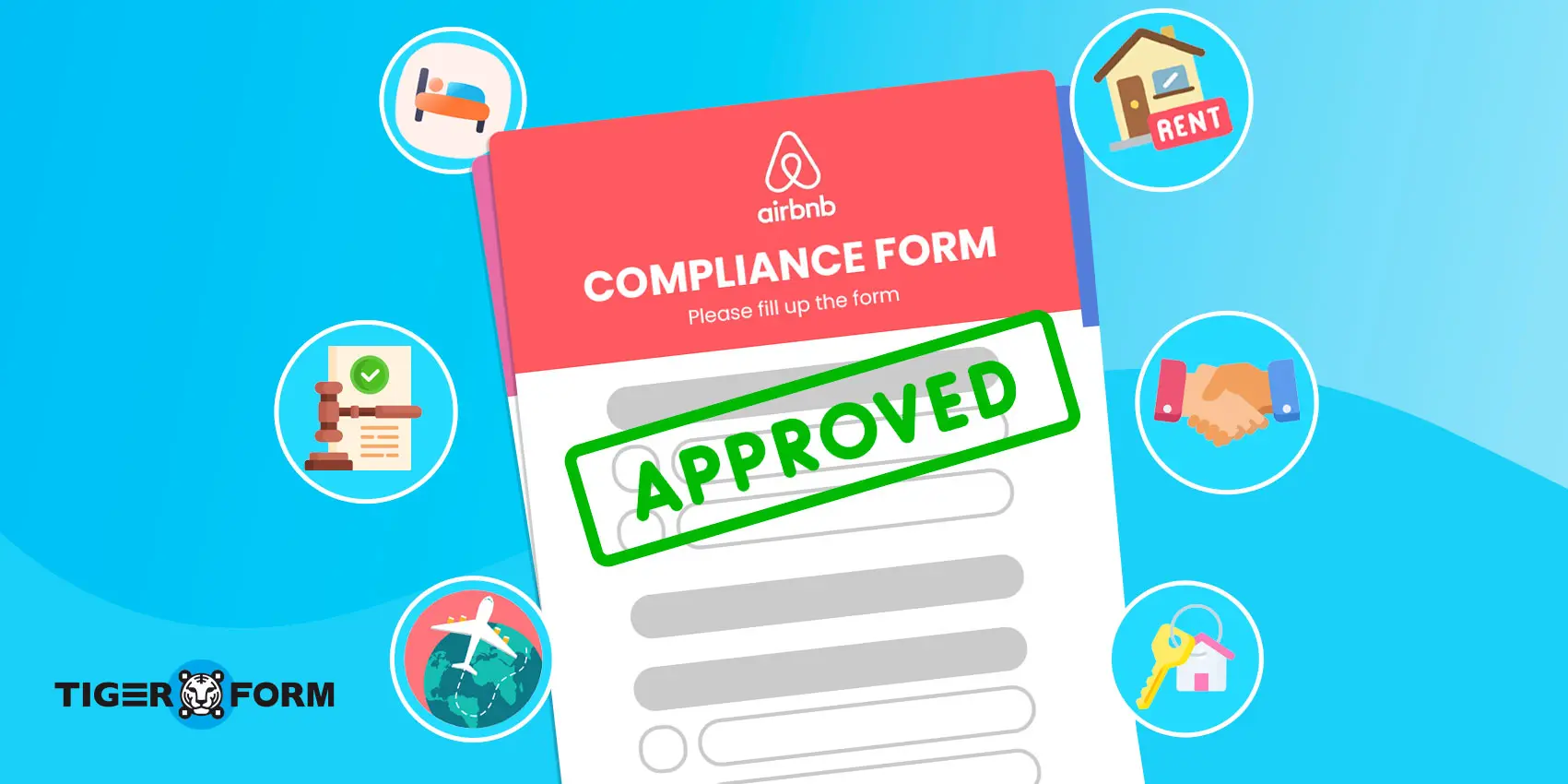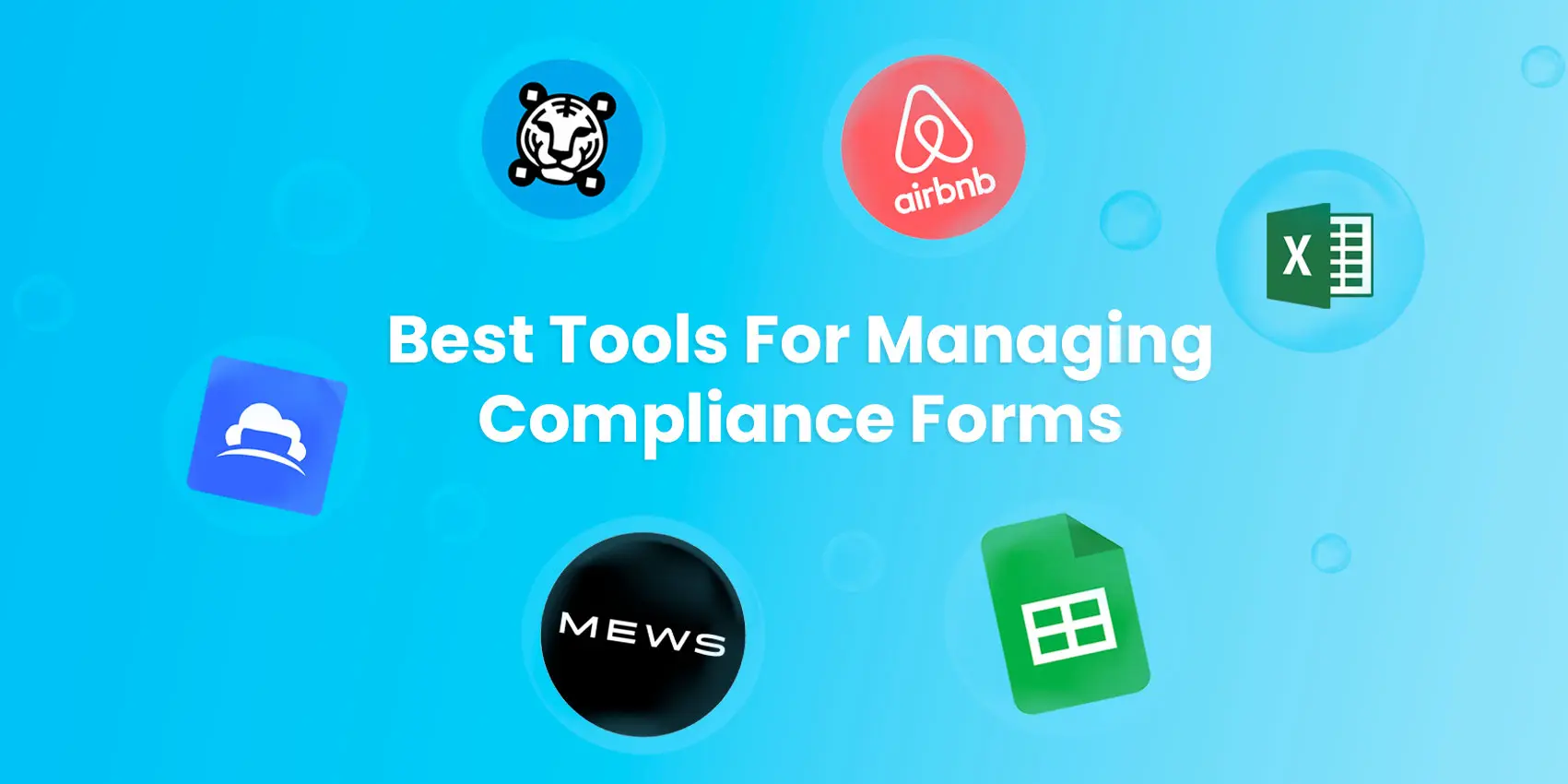
Compliance forms aren’t the first thing most property owners think about when listing on Airbnb, but they should be. While getting your property listed feels like the peak, a stack of paperwork behind that is just as important.
From licenses and tax documents to data privacy protocols, these forms guarantee your rental is legally compliant and fully protected.
You don’t want to risk penalties, legal issues, or suspended listings, right? This guide will walk you through the must-have compliance system and form for Airbnb hosting and managing.
It may seem overwhelming initially, but consider this your starting point toward lawful hosting. To make managing it all easier, we’ll introduce digital tools, like form builders, to help you keep your compliance system efficient.
What are compliance forms for short-term rentals?
Compliance forms are legal, procedural, and regulatory documents that confirm your short-term rental business operates within the rules of your local area, country, and any platforms you use.
When we say “forms,” we’re not just talking about one-page checklists. We’re discussing various documents from government agencies and internal policies. These forms prove you are running a legitimate, safe, secure short-term rental operation.
Failing to have the proper documentation in place can result in a fine and penalties for legal liability or even having your listing suspended or permanently removed. So, the sooner you get these done, the better.
Categories of the compliance system and their forms

1. Operational compliance documents
Business and operating licenses
Before listing a property on Airbnb, you must obtain the required licenses at the local and state levels to legally operate. Some cities also mandate a separate business license if you earn money through the platform.
Remember that even if your property is zoned residential, it doesn’t automatically mean short-term rentals are allowed. To list it on Airbnb, you must follow local requirements and obtain the proper approvals.
Here are some of the operating requirements for rental compliance:
- General business forms and permits/licenses
- Specific Short-Term Rental (STR) permit/license, also known as:
– Vacation rental permit
– Transient occupancy permit
– Short-term rental certificate
– Homestay permit
– Tourist accommodation license
- Some of the other related registrations & approvals:
– Property registration
– Homeowners Association (HOA) or Condo association approval
– LLC/Business entity registration (if applicable)
Zoning and land use compliance
Zoning rules govern where and what properties can be used for. Many cities restrict short-term rentals to specific neighborhoods or types of buildings (like rent-controlled apartments or high-rise condos). You may need a zoning compliance form or land-use review to show your rental meets local rules, especially for multi-unit or multiple properties.
Here are some of the zoning compliance requirements:
- Zoning compliance application: A part of a larger STR permit application
- Site plan
- Proof of primary residency/ownership
- Certificate of Occupancy (CO)
- Property deed/lease agreement
- Conditional Use Permit (CUP) / special exception permit application: In some zoning districts, short-term rentals are not “permitted by right” but may be allowed as a “conditional use” or “special exception.”
- Parking plan/documentation
Occupancy, noise, and house rules documentation
Cities often limit how many guests can stay in a property at once. It’s advisable to document and share your occupancy limits with guests. In many cases, it’s also required. Many cities also require you to provide a printed or digital copy of your house rules. You might also be required to post these rules on-site and submit them during license registration.
- Short-term rental agreement/guest agreement
- Explicit house rules document/signage
- Local ordinance/code summaries
- Guest registration form
Considerations for these forms and documentation:
- Make sure your Airbnb listing matches your compliance documents. What’s on paper should be reflected online.
- Share your policies in multiple ways: during booking, in pre-arrival messages, and inside the rental itself.
- Be clear about the consequences of breaking the rules. This helps prevent guests from claiming they didn’t know.
- Have an expert and legal advisor to review your documents, make sure they follow all local, state, and federal laws.
Health and safety certifications
Some jurisdictions require health or building department inspections before you can host. These might include checking for smoke and carbon monoxide detectors, adequate exits, fire extinguishers, and cleanliness standards. After passing inspection, you’ll typically receive a certificate that you need to renew periodically.
- Fire safety documentation
- Smoke alarm/detector certificates/records
- Fire extinguisher maintenance records
- Emergency exit plan/floor plan
- Property safety inspections
- Pre-rental safety inspection report
- Health Department Inspection Report
Note: less common but possible - Proof of insurance coverage: Airbnb’s Host Guarantee or AirCover provides some protection, but it’s often secondary and may have limitations
- Cleaning and sanitation protocols
- Water quality testing
Emergency protocols
Certain cities or counties require that you submit an emergency plan or contact protocol for guests. This could include contact info for emergency services, evacuation routes, and procedures in case of fire, flooding, or other disasters. Keeping this information on hand and sharing it with guests can also improve trust and satisfaction.
- Emergency contact information
- Emergency preparedness information
- Local ordinance compliance records
2. Data privacy compliance documents
Guest data handling and consent
Airbnb collects much guest information, but you might collect even more as a host, especially if you use third-party tools for check-in, messaging, or ID verification. Under laws like the General Data Protection Regulation (GDPR) in Europe or the CCPA in California, collecting and storing guest data requires clear documentation of how that data is handled.
- Privacy policy (host-specific)
- Consent form
- Data Subject Access Request (DSAR) procedure document
- Data breach response plan
- Internal data handling guidelines/training materials
Platform and third-party data sharing policies
You’re technically sharing guest data with third-party services using tools like Property Management Systems (PMS), channel managers, or smart lock integrations. Depending on the jurisdiction, you might need to disclose this to guests or regulators.
Having a third-party data-sharing policy shows that you’ve considered the privacy implications of your tech stack and that you’re operating responsibly.
- The third-party data sharing section in the privacy policy
- Data Processing Addendum (DPA)/vendor agreements: An important agreement between the Personal Information Controller (PIC) and the third party or the Personal Information Processor (PIP).
- Consent mechanism: for sharing guests’ data outside the core service (e.g., sharing email addresses with a marketing CRM)
- Data flow maps
Internal data access controls and audit logs
A basic policy outlining who can access guest data and under what circumstances is needed. Keep a digital access log if you use smart locks, keyless entry, or surveillance systems. This way will help you track who accessed what and when. Pair this with a simple data retention policy so it’s clear how long you keep those records.
- Internal Data Access Policy/Access Control Policy
- Data retention policy
- Service Level Agreement (SLA) with smart lock/keyless entry/PMS/surveillance providers
- Staff confidentiality agreements/training
3. Financial and tax compliance
Local tax registration
Most jurisdictions now require short-term rental hosts to register with tax authorities. Even if Airbnb collects and remits these business taxes for you, you may still need to register or report your activity. Registration forms often require estimating expected earnings and listing all properties you operate.
- Transient Occupancy Tax (TOT)/Hotel Occupancy Tax (HOT)/Lodging Tax/Tourist Tax Registration Form
- Sales tax permit/Seller’s permit (if applicable)
- Local Business License Application
Note: Needed if not covered by a general STR permit - Tax Exemption Certificates
Note: Rarely applicable to STRs - W-9 Form
Considerations for these forms and documentation:
- Many states have “marketplace facilitator” laws that require platforms like Airbnb to collect and remit lodging taxes on behalf of hosts. However, even if the platform collects and remits, you may still be required to REGISTER your property with the local tax authority. Always verify your specific obligations.
Remittance and documentation forms
Tax remittance forms are the official documents you file to pay taxes owed. Keeping track of what’s been filed, when, and how much you’ve paid is essential for compliance and future audits. Even if Airbnb handles some of this for you, maintaining your records is still your responsibility.
- VAT Return Form
Note: Needed in the UK, Germany, and Australia, for certain cases - TOT/HOT/ Lodging tax remittance forms
- Sales tax return report
- Form GST34 E (GST/HST return for registrants)
- Remittance Vouchers (RC158, RC159, RC160, RC177)
- VAT return form and VAT records
- Proof of tax remittance/payment confirmation
- Gross receipts and tax records
4. Technical security documentation
Cybersecurity policies
Especially relevant if you’re managing multiple listings or using software to automate bookings and messaging. A basic cybersecurity policy outlines how you protect sensitive data, like guest contact information or payment credentials.
- Cybersecurity policies
- Software/hardware security & update logs
Surveillance and monitoring disclosure
Using cameras or noise monitoring devices? First, make sure you’re allowed to use them; Airbnb bans surveillance in private areas like bedrooms or bathrooms.
Secondly, you’ll need a written disclosure for guests. This can be part of your house rules, but some areas require you to file a separate form or checklist confirming that your surveillance devices comply with local and platform rules.
- Written disclosure statement
- Can be within house rules or a separate form
- Platform-specific disclosure forms/fields
- Local regulatory compliance form
5. Insurance and liability forms
Active insurance certificates (liability/property)
Regular homeowner insurance often doesn’t cover rentals, so specialized coverage is essential. It typically includes liability, property damage, and income loss. If you’re managing multiple properties, these policies can confirm commercial-level protection. Reminder, you may need proof of coverage for licensing.
- Commercial general liability report
- Short-term rental property insurance
- Business interruption report
Incident reporting forms
Your insurer and possibly local authorities need an incident report if something goes wrong. Having a formal incident reporting template on hand makes it easier to gather key details immediately. Filing such reports can also be required to maintain specific licenses or insurance coverage.
Waivers and disclaimers
In some cases, particularly for properties with pools, hot tubs, or adventure gear, you may want guests to sign a waiver. While not always legally binding, they can reduce liability and show that you’ve warned guests of risks. Disclaimers about using amenities or potential hazards should also be posted in the home or your check-in materials.
Best tools to manage compliance documentation

Airbnb’s built-in tools
They provide a helpful foundation for basic compliance needs. Hosts have access to features such as tax summaries, safety checklists, and transaction records, which can assist with general reporting and platform-specific requirements.
These features are especially helpful for new or smaller-scale hosts. However, they are limited in scope and do not support storing or tracking external compliance forms such as licenses, insurance policies, or custom waivers.
Property Management System (Mews and Cloudbed)
Systems that offer more detailed compliance support, certainly for hosts managing multiple listings or working with teams. With PMS, you can automate renewal reminders and role-based access controls, which is convenient and will reduce the risk of oversight.
Despite these advantages, PMS platforms can involve a significant financial investment and may require a learning curve during initial setup. Additionally, certain compliance-specific features may be add-ons or limited to higher-tier plans.
Form QR codes (TIGER FORM)
This innovation is a convenient real-time data collection tool that is useful for waiver collection or maintenance checklists. Tools like TIGER FORM enable users to link QR codes to digital forms, making data submission quick and contactless.
While their flexibility and ease of use are significant advantages, many free versions have limitations. However, the mentioned provider offers affordable subscription plans that unlock wide functionality.

How to create a compliance form using TIGER FORM
Sign up for a form tool
Create an account with TIGER FORM to build your form.
Use templates or AI generation
You have two quick ways to start. You can either choose a form template or use the AI Form Builder to create one instantly. If you prefer speed, the AI option is perfect just type what you need, and it will generate a form for you in seconds. For example, you could enter: “Create an Emergency Protocol Form for my beachfront property listing the nearest hospital and evacuation route.”
Add or review the custom fields
If you used the AI Form Builder, most of the key fields, like names, e-signatures, and disclaimers, are already included. Your main task now is to review the AI-generated language carefully and make sure it aligns with your property details or business tone. Add any unique property-specific fields that matter, such as unit numbers, emergency contacts, or special instructions.
Preview and finalize
Double-check the form for clarity and errors, then publish when ready.
Generate a QR code
Create the QR code that links to your form; personalize it with colors or a logo if needed.
Download and share:
Save the QR code and share it through printed signs, emails, or your PMS
Track responses
Use the form tool’s analytics feature to monitor scans, submissions, and overall form engagement.
Spreadsheets (Google Spreadsheet and Excel)
They remain a reliable, low-cost tool for manually tracking compliance-related data. Their customizability and accessibility make them especially appealing for hosts who prefer a tailored approach.
However, spreadsheets require manual input and regular upkeep, which can lead to errors. They also don’t offer built-in features like alerts or access controls unless paired with other tools. You’ll need to integrate third-party tools like form creators or automation tools to improve functionality.
How to organize and maintain these forms
Compliance management doesn’t have to be complicated, but it requires a clear system. Instead of letting important forms get lost in emails or random folders, set up a simple structure that keeps everything easy to find and up to date. Follow these steps in organizing and handling your forms:
- Create spreadsheets or documents that record each form for central tracking. This way, you’ll always know what’s current and needs attention.
- Next, sort files by category. Use clear folder names and consistent labels to locate documents quickly, whether digital or paper. A logical filing system saves time and avoids frustration.
- Set aside time for regular check-ins, like every quarter or twice a year, to review documents and update anything that has expired or changed. A quick audit now prevents bigger headaches later.
- Finally, keep backups. Store digital copies in two places, either on your computer or in the cloud. And, scan paper documents for extra security. That way, you’re covered even if something gets lost or damaged.
Stay compliant through organized rental documentation
Making and maintaining your short-term rental compliant is surely a long and complex process. But with our guide, you have the roadmap for simplifying the tricky process.
From business licenses and tax documents to internal policies and guest forms, you’ve seen what’s required and how to stay organized without losing your guts and focus.
You’re systemizing your compliance documentation with the tools we introduced, like TIGER FORM, PMS platforms, and spreadsheets. Whether hosting one property or a dozen, the correct setup can save you time, money, and stress.
Organize your compliance forms with TIGER FORM now to build a compliant system!
FAQs
Do I need to renew my compliance forms annually?
Most licenses, permits, and insurance policies have expiration dates. Renewal timelines vary by city and document type, so setting reminders is crucial.
Can Airbnb suspend my listing for missing documentation?
Yes. If you fail to provide required local permits, safety documents, or tax info, Airbnb may temporarily or permanently deactivate your listing.
What’s the difference between a permit and a license for short-term rentals?
A license usually refers to legal permission to operate a business, while a permit may relate to specific conditions, such as zoning or occupancy. Some cities require both.
